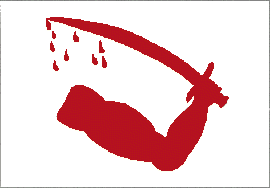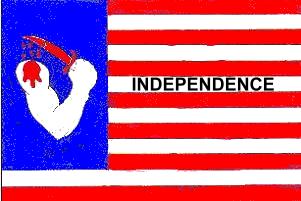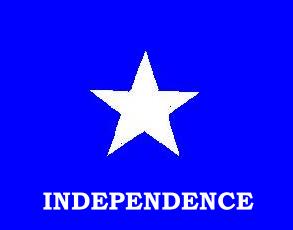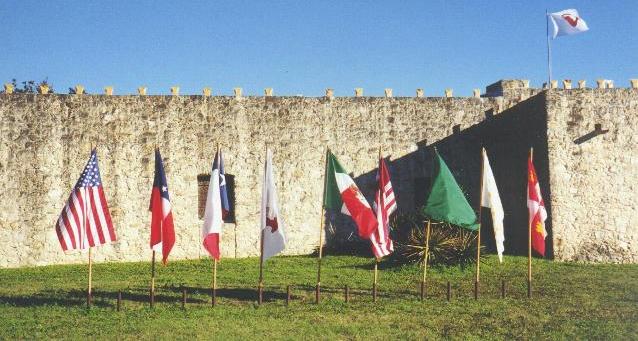SO3S OF DEWITT COLONY TEXAS
© 1997-2011, Wallace L. McKeehan, All Rights Reserved
Independence
Resolutions & Consultations-Index
Goliad Declaration of Independence, December 1835
The "Mecklenburg" of Texas
  
Why should we longer contend for charters [Constitution and laws of 1824]...Why
contend for the shadow, when the substance courts our acceptance? The price of each is the
same. War...and we have either to fight or flee...
Resolved that the former province and department of Texas is
a free, sovereign, and independent State...[with] all the powers, faculties, attributes,
and immunities of other independent nations.
After the Siege and Battle of San Antonio and the retreat of Gen. Cos
troops to the Rio Grande, the ratio of Texans for total and absolute independence of Texas
relative to those for independence as a State in the Mexican Republic and restoration of
the Constitution of 1824 continued to increase. The first and most formal regional
declaration was the Goliad Declaration of Independence, sometimes referred to as the "Mecklenburg
of Texas." [The Mecklenburg Declaration of May 1775 produced at a regional
convention of North Carolinians in Mecklenburg contained wording similar to that of the
American Declaration of Independence of 1776]. A meeting of 92 men, both members of
Capt. Phillip Dimmit's troops and local citizens, produced the following document on 20
Dec 1835 in Goliad:
| Solemnly impressed with a sense of the danger of the crisis to which
recent and remote events have conducted the public affairs of their country, the
undersigned prefer this method of laying before their fellow-citizens, a brief retrospect
of the light in which they regard both the present and the past, and of frankly declaring
for themselves, the policy and the uncompromising course which they have resolved to
pursue for the future. They have seen the enthusiasm and the heroic
toils of an army bartered for a capitulation, humiliating in itself, and repugnant in the
extreme to the pride and honor of the most lenient, and no sooner framed than evaded or
insultingly violated. They have seen their camp thronged, but too frequently, with those
who were more anxious to be served by, than to serve their country--with men more desirous
of being honored with command that capable of commanding.
They have seen the energies, the prowess, and the achievements of a
band worthy to have stood by Washington and receive command, and worthy to participate of
the inheritance of the sons of such a Father, frittered, dissipated, and evaporated away
for the want of that energy, union, and decision in council, which, though it must emanate
from the many, can only be exercised efficiently when concentrated in a single arm.
They have seen the busy aspirants for office running from the field to
the council ball, and from this back to the camp, seeking emolument and not service, and
swarming like hungry flies around the body politic. They have seen the deliberations of
the council and the volition of the camp distracted and paralyzed, by the interference of
an influence anti-patriotic in itself, and toc6 intimately interwoven with the paralyzing
policy of the past, to admit the hope of relief from its incorporation with that which can
alone avert the evils of the present crisis, and place the affairs of the country beyond
the reach of an immediate reaction.
They have witnessed these evils with bitter regrets, with swollen
hearts, and indignant bosoms. A revulsion is at hand. An army, recently powerless and
literally imprisoned, is now emancipated. From a comparatively harmless, passive, and
inactive attitude, they have been transferred to one pre-eminently commanding, active, and
imposing. The North and East of Mexico will now become the stronghold of centralism.
Thence it can sally in whatever direction its arch deviser may prefer to employ its
weapons. The counter-revolution in the interior once smothered, the whole fury of the
contest will be poured on Texas. She is principally populated with North-Americans. To
expel these from its territory, and parcel it out among the instruments of its wrath, will
combine the motive and the means for consummating the scheme of the President Dictator.
Already, we are denounced, proscribed, outlawed, and exiled from the country. Our lands,
peaceably and lawfully acquired, are solemnly pronounced the proper subject of
indiscriminate forfeiture, and our estates of confiscation. The laws and guarantees under
which we entered the country as colonists, tempted the unbroken silence, sought the
dangers of the wilderness, braved the prowling Indian, erected our numerous improvements,
and opened and subdued the earth to cultivation, are either abrogated or repealed, and now
trampled under the hoofs of the usurper's cavalry.
Why, then, should we longer contend for charters, which, we are again
and again told in the annals of the past, were never intended for our benefit? Even a
willingness on our part to defend them, has provoked the calamities of exterminating
warfare. Why contend for the shadow, when the substance courts our acceptance? The price
of each is the same. War--exterminating war--is waged; and we have either to fight or
flee.
We have indulged sympathy, too, for the condition of many whom, we
vainly flattered ourselves, were opposed, in common with their adopted brethren, to the
extension of military domination over the domain of Texas. But the siege of Bexar has
dissolved the illusion. Nearly all their physical force was in the line of the enemy and
armed with rifles. Seventy days occupation of the fortress of Goliad has also abundantly
demonstrated the general diffusion among the Creole population of a like attachment to the
institutions of their ancient tyrants. Intellectually enthralled, and strangers to the
blessings of regulated liberty, the only philanthropic service which we can ever force on
their acceptance, is that of example. In doing this, we need not expect or even hope for
their co-operation. When made the reluctant, but greatly benefited recipients of a new,
invigorating, and cherishing policy---a policy tendering equal, impartial, and
indiscriminate protection to all; to the low and the high, the humble and the well-born,
the poor and the rich, the ignorant and the educated, the simple and the shrewd---then,
and not before, will they become even useful auxiliaries in the work of political or moral
renovation.
It belongs to the North-Americans of Texas to set this bright, this
cheering, this all-subduing example. Let them call together their wise men. Let them be
jealous of the experienced, of the speculator, of every one anxious to serve as a
delegate, of every one hungry for power, or soliciting office; and of all too who have
thus far manifested a willingness to entertain or encourage those who have already tired
the patience of the existing Council with their solicitations and attendance. Those who
seek are seldom ever the best qualified to fill an office. Let them discard, too, the use
of names calculated only to deceive and bewilder, and return like men to the use of words
whose signification is settled and universally acknowledged. Let them call their assembly,
thus made up, a Convention; and let this convention, instead of declaring for
"the principles" of a constitution, for "the principles"
of Independence, or for those of Freedom and Sovereignty, boldly, and with one voice,
proclaim the Independence of Texas. Let the convention frame a constitution for the future
government of this favored land. Let them guard the instrument securely, by the
introduction of a full, clear, and comprehensive bill of rights. Let all this be done as
speedily as possible. Much useful labor has already been performed; but much is yet
required to complete the work.
The foregoing, we are fully aware, is a blunt, and in some respects, a
humiliating, but a faithful picture. However much we may wish, or however much we may be
interested, or feel disposed to deceive our enemy, let us carefully guard against
deceiving ourselves. We are in more danger from this---from his insinuating, secret,
silent, and unseen influence in our councils, both in the field and in the cabinet, and
from the use of his silver and gold, than from his numbers, his organization, or the
concentration of his power in a single arm. The gold of Philip purchased what his arms
could not subdue---the liberties of Greece. Our enemy, too, holds this weapon. Look well
to this, people of Texas, in the exercise of suffrage. Look to it, Counselors, your
appointments to office. Integrity is a precious jewel.
Men of Texas! nothing short of independence can place us on solid
ground. This step will. This step, too, will entitle us to confidence, and will procure us
credit abroad. Without it, every aid we receive must emanate from the enthusiasm of the
moment, and with the moment, will be liable to pass away or die forever. Unless we take
this step, no foreign power can either respect or even know us. None will hazard a rupture
with Mexico, impotent as she is, or incur censure from other powers for interference with
the internal affairs of a friendly State, to aid us in any way whatever. Our letters of
marque and reprisal must float at the mercy of every nation on the ocean. And whatever
courtesy or kindred feeling may do, or forbear to do, in aid of our struggle, prosecuted
on the present basis, it would be idle and worse than child-like to flatter ourselves with
the hope of any permanent benefit from this branch of the service, without frankly
declaring to the world, as a people, our independence of military Mexico. Let us then take
the tyrant and his hirelings at their word. They will not know us but as enemies. Let us,
then, know them hereafter, as other independent States know each other---as "enemies
in war, in peace, friends." Therefore, Be it Resolved,
1. That the former
province and department of Texas is, and of right ought to be, a free, sovereign, and
independent State.
2. That as such, it
has, and of right ought to have, all the powers, faculties, attributes, and immunities of
other independent nations.
3. That we, who hereto
set our names, pledge to each other our lives, our fortunes, and our sacred honor, to
sustain this declaration---relying with entire confidence upon the co-operation of our
fellow-citizens, and the approving smiles of the God of the living, to aid and conduct us
victoriously through the struggle, to the enjoyment of peace, union, and good government;
and invoking His malediction if we should either equivocate, or, in any manner whatever,
prove ourselves unworthy of the high destiny at which we aim.
Done in the town of Goliad, on Sunday, the 20th day of December, in the
year of our Lord one thousand eight hundred and thirty-five. |
For Biographies, Search
Handbook of Texas Online
| Signers of the Goliad Declaration Miguel Aldrete, Sayle Antoine, James W. Baylor, J.T. Bell, John Bowen,
John J. Bowman, Joseph Bowman, William S. Brown, E. Brush, Morgan Bryan, Joseph Cadle,
Manuel Carbajal, George W. Cash, Gustavas Cholwell, J. B. Dale, H. F. Davis, Jeremiah Day,
T. Mason Dennis, Charles M.
Despallier, Andrew Devereau, Philip Dimmitt, Spirse Dooley, James
Duncan, John Dunn, James Elder, E. B. W. Fitzgerald, David George, H. George, William
Gould, William Haddon, T. Hanson, Timothy Hart, William G. Hill, Nathaniel Holbrook,
William E. Howth, J. C. Hutchins, Peter Hynes, Ira Ingram, John James, D. M. Jones,
Francis Jones, John Johnson, Michael Kelly, J. D. Kilpatrick, Walter Lambert, W. H.
Living, Victor Loupy, Alexander Lynch, Charles Malone, Robert McClure, Edward McDonough,
Dougald McFarlane, Hugh McMinn, Charles Messer, Henry J. Morris, William Newland, Benjamin
Noble, C. J. O'Connor, James O'Connor, Thomas O'Connor, Michael O'Donnell, Patrick
O'Leary, G. W. Pain, C. A. Parker, D. H. Peeks, B. H. Perkins, John Pollan, Lewis Powell,
Albert Pratt, William Quint, Edmund Quirk, R. L. Redding, W. Redfield, Isaac Robinson,
William Robertson, James W. Scott, Charles Shingle, John Shelly, Albert Silsbee, Francis
P. Smith, Edward St. John, James St. John, Horace Stamans, Thomas Todd, Jefferson Ware,
George W. Welsh, Allen White, Benjamin J. White, Benjamin J. White Jr., David Wilson,
Alvin Woodward
I hereby certify the foregoing to be a true copy of the
original in my possession. IRA INGRAM, Secretary. Town of GOLIAD, December 22,1835. |
The declaration was transmitted to the Provisional
Government of Texas at San Felipe, printed and distributed in handbills. Because it was
the most strongest direct document calling for independence of Texas as a separate
Republic, it stimulated much discussion and controversy. According to author John Henry
Brown in History of Texas, a majority of the Provisional Government at this date
was still in favor of "continuing the contest to the end as an integral part of the
Mexico, under the abrogated constitution of 1824" and there were attempts to limit
distribution of the handbill among the general population.
 Origin of the
Brown and Dimmitt bloody-arm symbol of Texian Independence. The origin of
the defiant symbol used on both Capt. William Brown's and Capt. Phillip Dimmitt's banners
are an interesting subject discussed extensively by Hobart Huson in his work, Captain
Phillip Dimmitt's Commandancy of Goliad. It appears that Brown's flag appeared
earlier than that of Dimmitt and the former may have influenced the latter. Both Capt.
William Brown and his brother Jeremiah were seaman and later became naval officers in the
Republic of Texas. Huson contends that their naval orientation may have been behind
knowledge of the possibly Irish and European symbol and the precise design of the Brown
flag. Conceivably, the symbol was suggested by Irish colonists or those with close contact
with the Irish colonists from the Powers & Hewetson or McMullen & McGloin ventures
in the region. Huson points out that the symbol cannot be found in the French Revolution
or American Independence movements. Origin of the
Brown and Dimmitt bloody-arm symbol of Texian Independence. The origin of
the defiant symbol used on both Capt. William Brown's and Capt. Phillip Dimmitt's banners
are an interesting subject discussed extensively by Hobart Huson in his work, Captain
Phillip Dimmitt's Commandancy of Goliad. It appears that Brown's flag appeared
earlier than that of Dimmitt and the former may have influenced the latter. Both Capt.
William Brown and his brother Jeremiah were seaman and later became naval officers in the
Republic of Texas. Huson contends that their naval orientation may have been behind
knowledge of the possibly Irish and European symbol and the precise design of the Brown
flag. Conceivably, the symbol was suggested by Irish colonists or those with close contact
with the Irish colonists from the Powers & Hewetson or McMullen & McGloin ventures
in the region. Huson points out that the symbol cannot be found in the French Revolution
or American Independence movements.
From Huson, Captain Phillip Dimmitt's Commandancy of Goliad:
Miss Kathleen Blow, reference librarian at the University of Texas,
cites Arnold Whitteck's Symbols, Signs, and Their Meanings, published in London,
1963, and sent xerox of page which mentions the Coronation Medal of Charles I, of England,
"showing a design rather belligerent in character, showing an arm with a sword on the
reverse symbolizing the intention to prosecute war with vigor until peace is
restored." The design shows the weapon to be a sabre, or curved blade sword.
From the Reference Librarian of the Library of Congress came the classical and well known
account of the Bloody Hand of O'Neal, which is an episode in Irish traditional
history. The 'bloody hand' appears as an armorial device on the coats of arms of
numerous Irish and Scotch families besides the O'Neals and the McNeills. Insofar as
Dimmitt's design is concerned, the bloody hand, properly a left hand, is not apropos, for
the reasons that it is a hand and not an arm, and is a left hand rather than a right, and
is inconsistent with the arm with which the self-amputation was done. A few of the
bloody-hands are depicted as holding an upright dagger or short sword, but never a sabre.
So Dimmitt's bloody right-arm grasping a bloody sabre, ought to have its own legend - an
intriguing one - no doubt, if the design was not an original concept of the border
captain.
British crests or coats of arms, in which the bloody hand, the bloody
arm or arm grasping a bloody sword, scimiter, dagger, etc., do not necessarily relate to a
war for national independence as such, but to some individual exploit of an ancestor.
Perhaps no land is more replete with chronicles of pre-historic invasions than is Ireland.
Among its traditional lore are its Books of the Invasions. These undertake to
identify the pre-history of Ierne, with the Hindus, Persians, Jewish, Greek and the
Spanish predominant. In one of the later of these - the Milesian, as I now
recollect, occurs the incident of an invading flotilla emanating from Iberia, in which the
several chieftains involved compacted that the first who touched Irish soil should have
choice of territory for his projected kingdom. Upon approaching the shore, the
craft of the chieftain O'Neal, or O'Neill, lagged space. Whereupon that
doughty chief drew his sword, hacked off his left hand, and with his right hurled it upon
the shore. It fell ashore before his rivals could land. His priority was recognized.
A version of this legend appears in William S. Walsh, Handy-Book of
Literary Curosities, page 1070, Ulster, Red Hand of. At the request of my
friend, Colonel Sir Thomas Roberts, SBE, of County Kent, England, Mr. A. Colin Cole,
Windsor Herald of Arms, of the College of Arms, London, graciously supplied the following
information. Without assaying to be authoritative, he suggests the emblem might have been
inspired by the notable Irish family named Wall, which was seated in the area between
Limmerich and Waterford (which is the general area from which the Refugio Irish Colonists
came in 1834). Distinguished members of the Wall family immigrated to France and to Spain,
and in each of those lands became distinguished in the military and governmental services.
He refers to Edward Mac Lysaght's Irish Families, (which I have in my library, as
also Paul Murtaugh's Your Irish Coats-of-Arms. (Alas, I do not have Fairbain's
Crests. Plate XXVII of Mac Lysaght, shows the Wall coat of arms with as crest a naked arm
grasping a bloody scimiter. In Murtagh plate 35 no. 398, depicts the Wall coat of arms as
being similar in design (but not corresponding in color to that in Mac L.,) but with an
entirely different crest.
Sir Thomas also favored me with some points on the interpretation of
heraldic devices, which I quote, as follows:
"I see you have the story of the Bloody Hand of Ulster O.K. Yest,
is a left hand, remembering that everything on the shield (escutcheon) is as regarded by
the holder of the shield, not the Be-holder. The Bloody Hand is the usual sign of a
Baronet, our lowest hereditary title, so is not mentioned in the "blazon"
(heraldic description). It is also the mark of Ulster, see our Ulster Regional postage
stamps, as the Dragon is of Wales, etc. I doubt if the College of Heralds would allow the
(baronets?) bloody hand as any part of any coat of arms, except for its designated
purpose. It can be carried in dexter (right) cheif, or central chief, ie, top middle, but
less usual. The crest, carried on the correct helm, according to rank, was also for
identification, but is slightly less rigidly defined & regarded by the Heralds. The
motto - under the shield - is not rigidly regarded at all & many families have the
same & sometimes changed them."
SONS OF DEWITT
COLONY TEXAS
© 1997-2013, Wallace L. McKeehan, All Rights Reserved
Independence
Resolutions & Consultations-Index |



